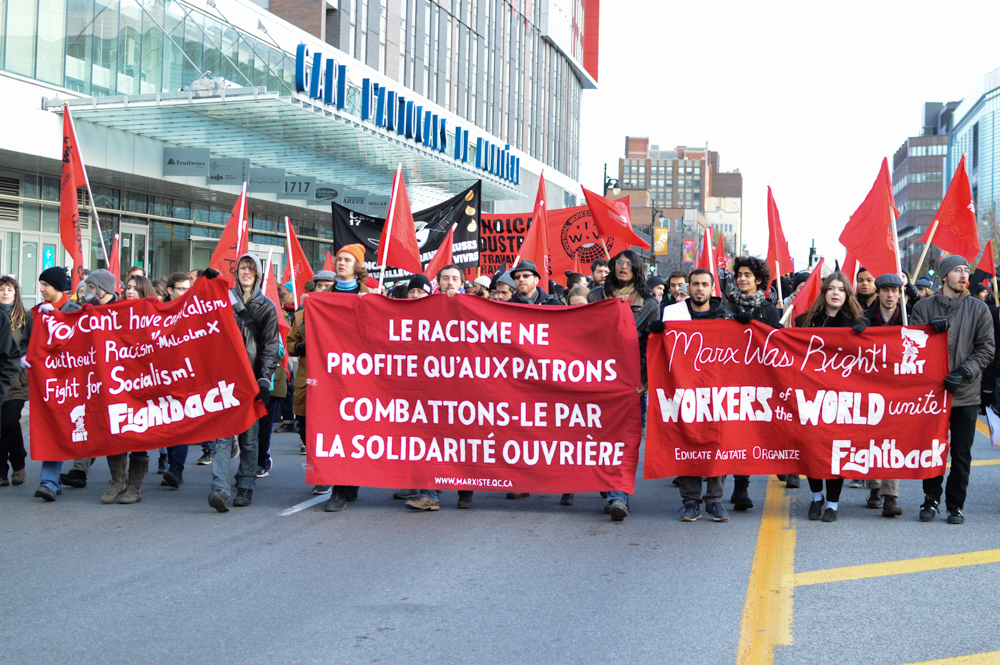Three-hour demonstration, endorsed by 162 organizations, tackled issues surrounding Palestine and immigration
Several hundred protesters gathered in downtown Montreal on Sunday, Nov. 12 to protest against hatred and systemic racism. The demonstration began with a number of speeches from event organizers at Place Émilie-Gamelin, outside the Berri-UQAM metro station, before protesters took to the streets.
Over the next three hours, protesters travelled through the Plateau-Mont-Royal borough and down Sherbrooke Street, towards Concordia’s downtown campus.
“We are here to denounce capitalism and austerity,” cried out one of the event’s organizer using a megaphone. “We are here to show we care about non-status people being deported despite Montreal being declared a sanctuary city.”
According to the Montreal Gazette, a video emerged on social media the night before the demonstration showing an anonymous group vandalizing a statue of Sir John A. MacDonald at Place du Canada.
Although the anonymous group identified themselves as “anti-colonial anti-racists” in the video description, they denied being affiliated with the demonstration organizers.
MacDonald, Canada’s first prime minister, has become a controversial figure in recent years for his role in creating the residential school system. The Assembly of First Nations chief Perry Bellegarde recently supported efforts to have MacDonald’s name removed from schools and monuments, according to the Toronto Star.
As they marched, protesters brandished signs with anti-xenophobic slogans on them, ranging from “Queers Against White Supremacy” and “Racism is Not Welcome Here” to “Racists Suck In Bed.” One protester held a sign reading, “If You Like Bill 62, Then Fuck You,” a reference to the controversial piece of Quebec legislation.
Passed in October, the provincial legislation bans people from giving or receiving public services while their face is covered. The bill, which will take effect sometime before July 2018, according to Global News, would require Muslim women, among others, to remove their face veils to identify themselves when boarding public transportation, and would ban public workers, such as doctors and teachers, from covering their faces at work. During a press conference on Oct. 18, Montreal’s mayor-elect Valérie Plante said that, while she agrees with the principle of the law, she believes the Quebec government should do “crucial homework to make sure that it is applicable to the realities of Montreal.”
Palestinian flags were also popular among protesters, who, throughout the march, chanted “from Montreal to Palestine, occupation is a crime.”
“I can’t believe racism is even something we have to protest,” said Julia Morian, a protestor at the event. “I’m protesting because [anti-racism] should be a very popular belief.”
One hundred and sixty-two organizations, including the Concordia Student Union and the Quebec Public Interest Research Group at Concordia, endorsed the march by signing a call to action condemning “the rise of racist hate speech in Quebec.” The call to action asked all groups that signed to denounce capitalism and austerity, oppose racism and participate in the march.
The call to action also cited recent political events, such as the election of President Donald Trump and the January 2017 Quebec City mosque shooting, as evidence of a rise in racism and hate crimes.
One of the groups present at the protest was Fightback Canada, a self-described Marxist journal and advocacy group. Farshad Acadian, an organizer and editor for Fightback, said the group was present at the protest and signed the call to action.
“We’re a journal with socialist analysis, but we’re also an organizing tool,” Acadian explained. “We want to help students understand issues and connect and fight back. This [protest] is fighting back.”
Another organization that signed the call to action was the Réseau des lesbiennes du Québec (RLQ), an advocacy group focused on the rights and equality of lesbians. For RLQ member Jessie Boideleau, the reason to protest was simple.
“We’re here because diversity should be supremacy.”
Photos by Mackenzie Lad
